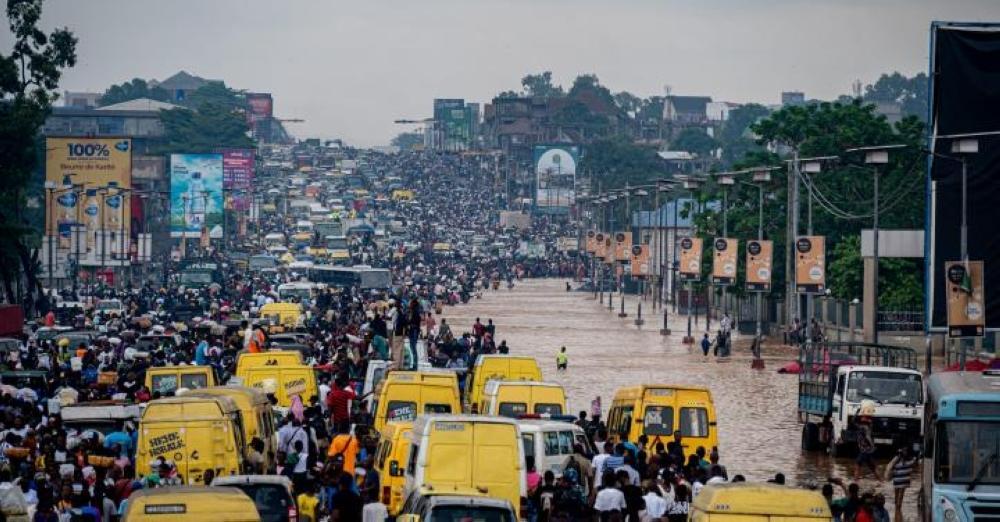Tom Ndahiro
Africa-Press – Rwanda. It’s official, this July 2025. The Democratic Republic of Congo, the undisputed heavyweight champion of wasted potential, has launched its tourism campaign: “Visit DRCongo”. Yes, you are not mistaken but heard it right. The same DRC that can’t keep its own cities lit, let alone safe, now wants the world to drop their passports in excitement and go jungle-cruising through chaos and carnage in the name of tourism.
There is an explanation if you don’t understand. DRC’s tourism campaign is a parody, underlining the absurdity of launching a global rebrand while the country collapses internally.
And how, you ask, does this brilliantly failing government intend to put its tourism campaign on the world map? Through football, of course. Because nothing screams “pack your bags and visit our war-torn, infrastructure-less country” like having a shiny logo slapped on the jersey of FC Barcelona, a club whose players have likely never heard of Ituri, let alone spell Kivu without Google Maps.
After all, if Rwanda could do it, why not DRC? Rwanda, that neighbor with actual roads, real hotels, working hospitals, gorillas that aren’t hunted for dinner, and an airport that isn’t a museum of missed flights.
I love the country that never misses an occasion to miss the point, as a matter of necessity.
Not to impress or compete
Rwanda’s “Visit Rwanda” campaign is not about impressing DRC. It wasn’t a flex. It wasn’t a competition. It was a vision. Rwanda signed deals with Arsenal, Paris Saint Germain, Bayern Munich and Atlético Madrid—not because it wanted to beat Congo in a PR contest (how do you compete with a black hole?), but because it had something to offer. A place to visit, where you don’t need a UN escort or a will notarized before your trip.
Let it be understood: Rwanda’s promotion is development-driven. It’s part of a broader national strategy involving tourism, investment, and soft power—not a playground rivalry with any failing neighbour.
But Kinshasa—oh brilliant Kinshasa—watched Rwanda and said: “Hold my Primus beer.”
Suddenly, Monaco and Barcelona are on speed dial. The idea? To launch “Visit DR Congo”, not with a tourism policy, not with domestic reforms, not with security guarantees, but by outsourcing all vision to European footballers who may end up needing bodyguards if they ever dare to actually visit. What’s next? A UEFA trophy tour through Walikale?
You can’t help but wonder: what exactly are they advertising? The thrill of potholes the size of small craters? The excitement of never knowing if the road will vanish into the bush mid-drive? The adrenaline of brushing shoulders with armed FDLR genocidaires or Islamist ADF terrorists at a checkpoint where your passport means less than a chicken?
Here’s where things turn not just tragic, but embarrassingly misinformed. The entire logic behind Kinshasa’s sudden love affair with jersey-sponsoring football clubs is based on a fantasy competition with Rwanda—one that exists only in the Congolese imagination.
Rwanda’s strategy wasn’t a reaction to anyone. It was a deliberate effort to project its own development vision to a global audience. When Rwanda launched “Visit Rwanda,” it did so to enhance its soft power, attract investment, expand tourism, and brand itself as a forward-looking African country.
It competed, yes—but against its own history of tragedy, against its own goals, against its limited resources, and against global indifference. DRC, in contrast, is not competing with Rwanda. It is competing with itself in the art of national regression.
The obsession with Rwanda mirrors not geopolitical rivalry, but a form of inferiority complex, where the DRC conveys its failures by projecting jealousy.
Even worse, DRC has chosen Rwanda as its imaginary enemy instead of its actual challenges—corruption, impunity, insecurity, and a political class that uses genocide survivors as scapegoats.
And then there’s Burundi. Oh dear Burundi—another neighbor that isn’t even pretending to compete. Instead of opening its borders to Rwanda and tapping into regional tourism flows, Burundi blocks borders, sulks in state-sponsored sulking, and occasionally reopens gates like a drunk teenager slamming a door during an emotional tantrum.
Burundi fails itself, and it fails others—especially those who could benefit from a regional tourism corridor. Unlike Kenya or Tanzania, countries that developed tourist experiences with professionalism and stability, DRC and Burundi appear to confuse tourism policy with performative patriotism and self-sabotage.
Rwanda built itself into a destination. DRC is building logos on shirts while its airports don’t have running water. And Burundi? Burundi can’t even decide if it wants to be on the tourists’ map.
On a serious note, Burundi’s political introversion is as detrimental as DRC’s performative chauvinism. Both miss opportunities that Rwanda and East African giants have seized through regional integration and stability.
Attractions in the DRC beyond imagination
Ever thought about where sense goes on safari? The DRC’s tourism brochure, if ever printed, would read like a dystopian travel novel:
Wildlife? Oh no, we don’t have animals anymore. The forests are rich, yes, but in meat-deprived cities, monkeys, antelopes, and even gorillas have long since migrated—from the jungle to the stomach. In a country where cannibalism is accepted live on camera, primates are endangered. Try finding a giraffe, buffalo or a hippo. We’ll wait.
Nature? We’ve got that. Lush, virgin tropical forests. But don’t expect to see them on wheels. You’ll certainly need a helicopter. Or divine intervention.
Hospitality? The only beds reliably available are in the pockets of Kinshasa’s corrupt elite. Maybe “Visit Goma”. Hospitals? Mostly signs on buildings with expired medicine and no power. Schools? Yes, chalk still exists—on walls with no teachers, students or hope.
Security? Oh, it’s bustling or buzzing. With bullets, bombings, and bizarre militia groups in their hundreds. Congo has certainly perfected the art of outsourced chaos: FDLR genocidaires? Check. ADF terrorists? Present. Wazalendo patriots? Everywhere. Burundi’s troops? Why not?
European mercenaries and Belgian “advisors”? Bienvenue. American contractors? Bring in the drones. But whatever you do, don’t ask where the Congolese army is. They’re either hiding or looting.
You will not be disappointed as a visitor to see disorder. The list of non-state actors, and foreign forces operating in DRC reads like a United Nations blacklist. Tourism doesn’t thrive in a theatre of proxy wars and warlordism. Perhaps, in the country you are visiting.
And President Tshisekedi wants you to visit. Yes, he does. Because in his mind, if he can’t fix the country, at least he can rebrand it.
The rise of mediocrity
Yes, it happened—from pizza to presidency: It’s an inspiring story, really. Once upon a time, in the peaceful streets of Belgium, there lived a man who couldn’t deliver pizzas on time. So he returned to his home country and delivered a political catastrophe instead.
This biting character sketch emphasizes the absurdity of unprepared leadership inheriting a fragile state and making it worse—through cluelessness disguised as charisma.
President Felix Tshisekedi, the man who couldn’t deliver a Margherita, is now the proud commander of a country where nothing gets delivered—not peace he tore into pieces—not services. The people from Goma to Bukavu cannot visit each other by road unless they transit through Rwanda.
Yes, in 2025, if you want to travel from one Congolese city to another, your best option is to exit the country, pass through Rwanda, and re-enter. A tourism campaign that relies on another country’s infrastructure. If this isn’t topmost wit, what is?
And what’s most incredible is how Tshisekedi and his propaganda elite—a circus of clowns including Patrick Muyaya, Muhindo Nzangi, Julien Paluku, Justin Bitakwira, and that walking contradiction called Denis Mukwege—have managed to turn reality into fiction and fiction into governance.
Mastery of miscommunication
In most countries, governments fight to disarm rebels. In DRC, they create, finance, arm them—and rename them. Enter the “Wazalendo”, a militia movement turned PR stunt, a Frankenstein of Tshisekedi’s own making. A patriot is someone who loves their country. In Congo, a patriot is someone who burns villages, kills civilians, and gets rewarded with weapons.
Now that’s something tourists should see! “Visit Congo,” the poster should say, “and witness how a government creates its own enemies for fun and foreign aid.”
And don’t forget the FDLR genocidaires, now official partners in national security. Yes, the same criminals who helped orchestrate the Genocide Against the Tutsi in Rwanda. In Congo, they are now allies, guests of honor in the battle against Tutsi-looking Congolese. Why send them to The Hague when you can house them in North Kivu and pay them in minerals?
This is not just a moral scandal—it’s a structural one. DRC rewards impunity while punishing citizenship. No amount of branding can mask a policy of ethnic betrayal.
And since we’re talking about rebranding, let’s talk about why Tshisekedi is so obsessed with these football deals. It’s not about tourism. It’s about appeasement. Specifically, domestic appeasement of Rwanda-haters. In a country where hating Rwanda sells better than soap, Tshisekedi’s camp figured if you can’t govern, at least you can entertain the mob.
Regrettably, populism in DRC has shifted from rhetoric to policy: manufacture an enemy, ignore governance, entertain the masses with political scapegoats.
“Visit DRCongo” is not for foreigners—it’s a dog whistle to a population fed daily doses of anti-Rwanda propaganda, fed on state TV, public speeches, and university lectures turned into witch hunts.
Kinshasa’s political elite believes that slapping a tourism slogan on Barcelona’s shirt is a way to reclaim African dignity. Not by building roads or schools. Not by improving health care or uniting the country. But by trolling Rwanda.
They don’t even understand that Rwanda didn’t start with PSG. It started with planning. With cleaning streets, building parks, securing villages, protecting wildlife, and training hospitality workers. In DRC, tourism starts with a press conference and ends with a disappearing budget.
The tangible sightseeing
If you’re curious about how to institutionalize failure and corruption at the highest levels, DRC is your classroom. Come for the corruption, stay for the spectacle. The presidential family runs mines—like backyard kiosks, warlords run provinces like mafia bosses, and millions vanish without an audit.
There’s no better country to study the logistics of looting dressed as governance, where public funds are public jokes, and national reconstruction is just a catchphrase tossed between champagne glasses in Kinshasa’s gated villas. Visit DRC and observe how state-building is reversed and the national interest auctioned to the highest bidder—if not burned in advance.
DRC is a country where political decay is not accidental, but systemic and profitable.
To the world, “Visit DRCongo” is a punchline. To Tshisekedi, it’s a policy. To the Congolese people, it’s a cruel joke. To regional peace, it’s a ticking time bomb.
But still, if you’re feeling adventurous (and expendable), do visit. Come and see a government that governs by excuses. A nation rich in minerals, poor in principles. A political class that thrives on commotion, calls it patriotism, and brands it for tourists.
Bring a drone, not a suitcase. Pack courage, not curiosity. Don’t ask too many questions. Just come. Learn. And maybe cry.
Or laugh. That might be the only thing working in DRC these days.
Source: The New Times
For More News And Analysis About Rwanda Follow Africa-Press






